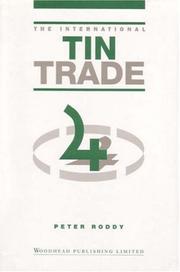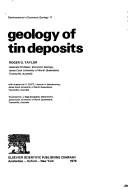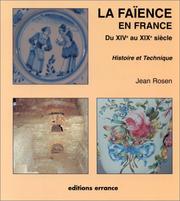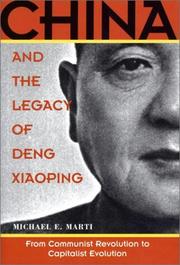| Listing 1 - 10 of 129 | << page >> |
Sort by
|
Book
ISBN: 131731204X 1317312031 1315652099 9781317312048 9781317312031 9781138119772 Year: 2015 Publisher: London Taylor and Francis
Abstract | Keywords | Export | Availability | Bookmark
 Loading...
Loading...Choose an application
- Reference Manager
- EndNote
- RefWorks (Direct export to RefWorks)
Tin. --- Substitution (Technology) --- Substitution (Economics)
Book
ISBN: 1526773414 1526773392 9781526773395 9781526773418 1526773384 9781526773388 Year: 2020 Publisher: Yorkshire Philadelphia
Abstract | Keywords | Export | Availability | Bookmark
 Loading...
Loading...Choose an application
- Reference Manager
- EndNote
- RefWorks (Direct export to RefWorks)
Book
ISBN: 1907747788 1000951383 1000946428 Year: 2008 Publisher: Leeds, U.K. : Maney, for the Institute of Materials, Minerals and Mining,
Abstract | Keywords | Export | Availability | Bookmark
 Loading...
Loading...Choose an application
- Reference Manager
- EndNote
- RefWorks (Direct export to RefWorks)
Book
Year: 2013 Publisher: Boston : Academic Studies Press,
Abstract | Keywords | Export | Availability | Bookmark
 Loading...
Loading...Choose an application
- Reference Manager
- EndNote
- RefWorks (Direct export to RefWorks)
"After Evgeny Zamiatin emigrated from the USSR in 1931, he was systematically airbrushed out of Soviet literary history, despite the central role he had played in the cultural life of Russia's northern capital for nearly twenty years. Since the collapse of the Soviet Union, his writings have gradually been rediscovered in Russia, but with his archives scattered between Russia, France, and the USA, the project of reconstructing the story of his life has been a complex task. This book, the first full biography of Zamiatin in any language, draws upon his extensive correspondence and other documents in order to provide an account of his life which explores his intimate preoccupations, as well as uncovering the political and cultural background to many of his works. It reveals a man of strong will and high principles, who negotiated the political dilemmas of his day--including his relationship with Stalin--with great shrewdness."--Amazon.

ISBN: 9781845699208 1845699203 185573043X 9781855730434 Year: 2011 Publisher: Cambridge, England : Woodhead Publishing Limited,
Abstract | Keywords | Export | Availability | Bookmark
 Loading...
Loading...Choose an application
- Reference Manager
- EndNote
- RefWorks (Direct export to RefWorks)
A practical and authoritative book covering every aspect of the tin trade beginning with its origins and history including the traumatic events of 1985 and their aftermath, and going on to deal with the mining and production processes. Aspects of the trading process are covered including trading techniques and strategies in both physical and futures markets.
Foreign trade. International trade --- History --- Tin industry. --- International trade.

ISBN: 0444418059 1299923585 0444597905 9780444597908 9780444418050 0444412506 9780444412508 Year: 1979 Volume: 11 Publisher: Amsterdam : Elsevier Scientific Publishing,
Abstract | Keywords | Export | Availability | Bookmark
 Loading...
Loading...Choose an application
- Reference Manager
- EndNote
- RefWorks (Direct export to RefWorks)
Geology of Tin Deposits
Tin ores --- Tin ores. --- Ores --- ETAIN --- MATIERES UTILES --- ELEMENTS CHIMIQUES --- GEOLOGIE APPLIQUEE --- GEOGRAPHIE INDUSTRIELLE ET MINIERE --- SYSTEMATIQUE DES RESSOURCES NATURELLES --- Geology, Economic.

ISBN: 2877721078 2958072606 9782877721073 Year: 1995 Publisher: Paris: Errance,
Abstract | Keywords | Export | Availability | Bookmark
 Loading...
Loading...Choose an application
- Reference Manager
- EndNote
- RefWorks (Direct export to RefWorks)
undefined
Faience --- History. --- Fayence --- History --- Pottery --- Faience - France - History. --- European history --- tin glaze earthenware --- France
Book
ISBN: 1608052656 9781608052653 Year: 2011 Publisher: [Italy] : Bentham Science Publishers,
Abstract | Keywords | Export | Availability | Bookmark
 Loading...
Loading...Choose an application
- Reference Manager
- EndNote
- RefWorks (Direct export to RefWorks)
Organotins are widespread contaminants especially of water environments. Their chemically versatile structure makes organotin compounds able to bind to a variety of biomolecules thus widely affecting biological functions. Trisubstituted molecules, namely tributyltin (TBT) and triphenyltin (TPhT), have been widely employed in antifouling paints and are also exploited as plastic stabilizers that unfortunately cause harmful biological effects. Persistent bioaccumulation has resulted in organotins becoming a significant environmental threat.
Organotin compounds. --- Biochemistry. --- Biology. --- Biological chemistry --- Chemical composition of organisms --- Organisms --- Physiological chemistry --- Biology --- Chemistry --- Medical sciences --- Life sciences --- Biomass --- Life (Biology) --- Natural history --- Tin organic compounds --- Organometallic compounds --- Tin compounds --- Composition
Book
ISBN: 0674062833 9780674062832 9780674055445 0674055446 9780674055 9789780674052 Year: 2011 Publisher: Cambridge, MA
Abstract | Keywords | Export | Availability | Bookmark
 Loading...
Loading...Choose an application
- Reference Manager
- EndNote
- RefWorks (Direct export to RefWorks)
Perhaps no one in the twentieth century had a greater long-term impact on world history than Deng Xiaoping. And no scholar of contemporary East Asian history and culture is better qualified than Ezra Vogel to disentangle the many contradictions embodied in the life and legacy of China's boldest strategist. Once described by Mao Zedong as a "needle inside a ball of cotton," Deng was the pragmatic yet disciplined driving force behind China's radical transformation in the late twentieth century. He confronted the damage wrought by the Cultural Revolution, dissolved Mao's cult of personality, and loosened the economic and social policies that had stunted China's growth. Obsessed with modernization and technology, Deng opened trade relations with the West, which lifted hundreds of millions of his countrymen out of poverty. Yet at the same time he answered to his authoritarian roots, most notably when he ordered the crackdown in June 1989 at Tiananmen Square. Deng's youthful commitment to the Communist Party was cemented in Paris in the early 1920's, among a group of Chinese student-workers that also included Zhou Enlai. Deng returned home in 1927 to join the Chinese Revolution on the ground floor. In the fifty years of his tumultuous rise to power, he endured accusations, purges, and even exile before becoming China's preeminent leader from 1978 to 1989 and again in 1992. When he reached the top, Deng saw an opportunity to creatively destroy much of the economic system he had helped build for five decades as a loyal follower of Mao-and he did not hesitate.
Heads of state --- Deng, Xiaoping, --- Teng, Hsiao-pʻing, --- Teng, Shiao-ping, --- Tŭng, So-pʻyŏng, --- Tō, Shōhei, --- Dén, Si︠a︡o-pin, --- Deng, Xiao Ping, --- Dengxiaoping, --- Teng, Hsziao-ping, --- Дэн, Сяопин, --- Dėn, Si︠a︡opin, --- Đặng, Tiểu Bình, --- Tiṅ, Źaʼo-phiṅ, --- Tiṅ-źaʼo-phiṅ, --- 鄧小平, --- 邓小平, --- [トウ] 小平, --- Deng, Bin, --- Teng, Pin, --- 邓斌, --- Tiṅ-śi, --- China --- Politics and government

ISBN: 1612342132 9781612342139 1574884166 9781574884166 1574885405 Year: 2002 Publisher: Washington, D.C. Potomac Books, Inc.
Abstract | Keywords | Export | Availability | Bookmark
 Loading...
Loading...Choose an application
- Reference Manager
- EndNote
- RefWorks (Direct export to RefWorks)
China and the Legacy of Deng Xiaoping documents a turning point in the Chinese communist revolution that elevates Deng to a role equal to that of Mao. Dr. Marti explores post-Tiananmen domestic political wrangling and offers the first documentation of Deng's efforts to link all the major elements of society-the PLA, the Party, the revolutionary elders, and the regional governors-into a coalition whose survival depends on the success of his economic policies.Understanding this sense of commitment to China's long-term goals has significant implications for predicting the outcome of the current s
Deng, Xiaoping, --- Teng, Hsiao-pʻing, --- Teng, Shiao-ping, --- Tŭng, So-pʻyŏng, --- Tō, Shōhei, --- Dén, Si︠a︡o-pin, --- Deng, Xiao Ping, --- Dengxiaoping, --- Teng, Hsziao-ping, --- Дэн, Сяопин, --- Dėn, Si︠a︡opin, --- Đặng, Tiểu Bình, --- Tiṅ, Źaʼo-phiṅ, --- Tiṅ-źaʼo-phiṅ, --- 鄧小平, --- 邓小平, --- [トウ] 小平, --- Deng, Bin, --- Teng, Pin, --- 邓斌, --- Tiṅ-śi, --- China --- Economic policy
| Listing 1 - 10 of 129 | << page >> |
Sort by
|

 Search
Search Feedback
Feedback About UniCat
About UniCat  Help
Help News
News